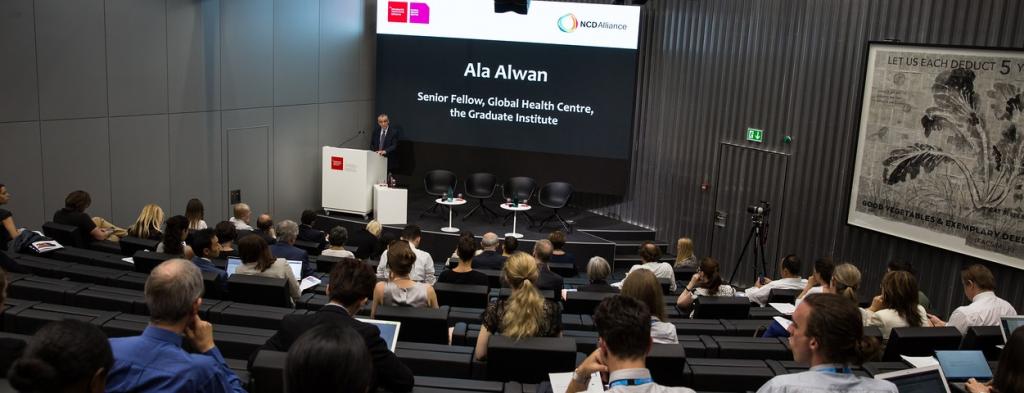As noncommunicable diseases (NCDs) constitute one of the greatest challenges for health and development, the Global Health Centre (GHC), in collaboration with the NCD Alliance, convened a multistakeholder panel on “Governing Non-Communicable Diseases - Addressing the Commercial Determinants of Health” as a side-event during the 70th session of the World Health Assembly. The panel, moderated by Dr Ala Alwan, discussed the various legal, regulatory, policy and voluntary measures that different stakeholders ranging from government to civil society and the private sector have been taking to combat the burden of NCDs.
GHC Director Ilona Kickbusch outlined how the commercial determinants of health (CDOH) are closely linked to political determinants of health. As the private sector contributes to job and income creation of countries and individuals, the interplay of these determinants is sensitive and political. The goal is to navigate this narrow space to create both health and wealth, not just the latter on the expense of the first.
The government has a central role in taking the lead in policy formulation and in creating a political space for action. At the same time, political leadership in this area is not an easy feat for many governments. A successful example of persistent negotiations and legal reforms was presented by the Minister of Health of Chile, Carmen Castillo, who outlined the Chile’s political action in combatting the NCD and obesity epidemics the country is facing. “Half of the children in the first class of school are overweight or obese, so we had to act fast” she said, before presenting the “high-in” warning labels and plain packaging laws the government has recently implemented. Other policies Chile adopted include a ban of advertising that targets under 14-year olds in all media channels, and the minister added “this is not the end, we will do more”.
Although progress in many areas has occurred in the past decade, many challenges remain. In particular, the role of the private sector is crucial and yet, debated. Rocco Renaldi from the International Food and Beverage Alliance (IFBA) emphasised how actors are ultimately a part and product of the wider system in which they operate. He highlighted the need for governments to create a regulated space and to encourage systemic change within the private sector which will allow them to adjust their strategies to meet the NCD challenge. However, and while welcoming dialogue and discussion, NCD Alliance Executive Director Katie Dain considers that the private sector has no role in policy development as this remains the responsibility of governments. Even though the Sustainable Development Goals have opened the door for greater private sector involvement in health, she cautioned that this involvement should be approached carefully.
The event made also a clear case for enhanced engagement between different sectors of government. This is fundamental for achieving a stable system of accountability, monitoring and implementation and for creating clear division of labour and roles between different actors within the government, but also between governments and the private sector and civil society.
This discussion at the margins of the 2017 World Health Assembly can be considered as a stepping stone in paving the way for the preparatory process towards the 2018 High-level Meeting of the General Assembly on the Prevention and Control of Non-Communicable Diseases. The GHC will remain engaged in this topic and will facilitate further public dialogues on this topic to strengthen and support the global action on NCDs.
A recording of the event, as well as other materials, are available here.


